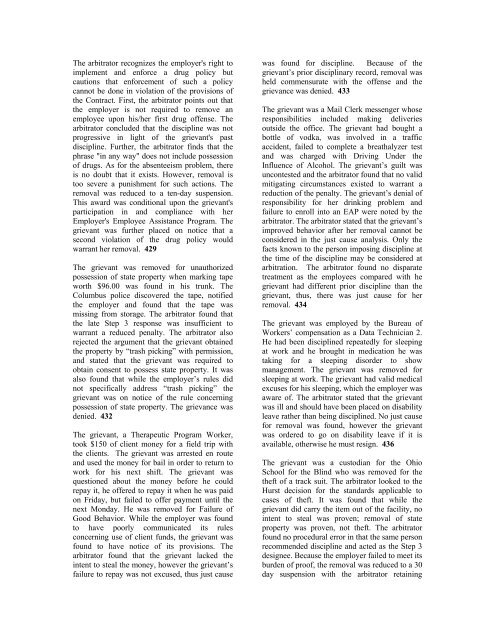by Contract Number (PDF) - OCSEA
by Contract Number (PDF) - OCSEA
by Contract Number (PDF) - OCSEA
Create successful ePaper yourself
Turn your PDF publications into a flip-book with our unique Google optimized e-Paper software.
The arbitrator recognizes the employer's right to<br />
implement and enforce a drug policy but<br />
cautions that enforcement of such a policy<br />
cannot be done in violation of the provisions of<br />
the <strong>Contract</strong>. First, the arbitrator points out that<br />
the employer is not required to remove an<br />
employee upon his/her first drug offense. The<br />
arbitrator concluded that the discipline was not<br />
progressive in light of the grievant's past<br />
discipline. Further, the arbitrator finds that the<br />
phrase "in any way" does not include possession<br />
of drugs. As for the absenteeism problem, there<br />
is no doubt that it exists. However, removal is<br />
too severe a punishment for such actions. The<br />
removal was reduced to a ten-day suspension.<br />
This award was conditional upon the grievant's<br />
participation in and compliance with her<br />
Employer's Employee Assistance Program. The<br />
grievant was further placed on notice that a<br />
second violation of the drug policy would<br />
warrant her removal. 429<br />
The grievant was removed for unauthorized<br />
possession of state property when marking tape<br />
worth $96.00 was found in his trunk. The<br />
Columbus police discovered the tape, notified<br />
the employer and found that the tape was<br />
missing from storage. The arbitrator found that<br />
the late Step 3 response was insufficient to<br />
warrant a reduced penalty. The arbitrator also<br />
rejected the argument that the grievant obtained<br />
the property <strong>by</strong> “trash picking” with permission,<br />
and stated that the grievant was required to<br />
obtain consent to possess state property. It was<br />
also found that while the employer’s rules did<br />
not specifically address “trash picking” the<br />
grievant was on notice of the rule concerning<br />
possession of state property. The grievance was<br />
denied. 432<br />
The grievant, a Therapeutic Program Worker,<br />
took $150 of client money for a field trip with<br />
the clients. The grievant was arrested en route<br />
and used the money for bail in order to return to<br />
work for his next shift. The grievant was<br />
questioned about the money before he could<br />
repay it, he offered to repay it when he was paid<br />
on Friday, but failed to offer payment until the<br />
next Monday. He was removed for Failure of<br />
Good Behavior. While the employer was found<br />
to have poorly communicated its rules<br />
concerning use of client funds, the grievant was<br />
found to have notice of its provisions. The<br />
arbitrator found that the grievant lacked the<br />
intent to steal the money, however the grievant’s<br />
failure to repay was not excused, thus just cause<br />
was found for discipline. Because of the<br />
grievant’s prior disciplinary record, removal was<br />
held commensurate with the offense and the<br />
grievance was denied. 433<br />
The grievant was a Mail Clerk messenger whose<br />
responsibilities included making deliveries<br />
outside the office. The grievant had bought a<br />
bottle of vodka, was involved in a traffic<br />
accident, failed to complete a breathalyzer test<br />
and was charged with Driving Under the<br />
Influence of Alcohol. The grievant’s guilt was<br />
uncontested and the arbitrator found that no valid<br />
mitigating circumstances existed to warrant a<br />
reduction of the penalty. The grievant’s denial of<br />
responsibility for her drinking problem and<br />
failure to enroll into an EAP were noted <strong>by</strong> the<br />
arbitrator. The arbitrator stated that the grievant’s<br />
improved behavior after her removal cannot be<br />
considered in the just cause analysis. Only the<br />
facts known to the person imposing discipline at<br />
the time of the discipline may be considered at<br />
arbitration. The arbitrator found no disparate<br />
treatment as the employees compared with he<br />
grievant had different prior discipline than the<br />
grievant, thus, there was just cause for her<br />
removal. 434<br />
The grievant was employed <strong>by</strong> the Bureau of<br />
Workers’ compensation as a Data Technician 2.<br />
He had been disciplined repeatedly for sleeping<br />
at work and he brought in medication he was<br />
taking for a sleeping disorder to show<br />
management. The grievant was removed for<br />
sleeping at work. The grievant had valid medical<br />
excuses for his sleeping, which the employer was<br />
aware of. The arbitrator stated that the grievant<br />
was ill and should have been placed on disability<br />
leave rather than being disciplined. No just cause<br />
for removal was found, however the grievant<br />
was ordered to go on disability leave if it is<br />
available, otherwise he must resign. 436<br />
The grievant was a custodian for the Ohio<br />
School for the Blind who was removed for the<br />
theft of a track suit. The arbitrator looked to the<br />
Hurst decision for the standards applicable to<br />
cases of theft. It was found that while the<br />
grievant did carry the item out of the facility, no<br />
intent to steal was proven; removal of state<br />
property was proven, not theft. The arbitrator<br />
found no procedural error in that the same person<br />
recommended discipline and acted as the Step 3<br />
designee. Because the employer failed to meet its<br />
burden of proof, the removal was reduced to a 30<br />
day suspension with the arbitrator retaining
















